- Home
- Vince Flynn
The Last Man Page 22
The Last Man Read online
Page 22
“And I can promise you, if you’re lying to me or this is some kind of trap, you’re as good as dead.”
“I would never do such a thing.”
“Really,” the American said in a disbelieving voice. “You know General Qayem?”
Zahir cringed. This was the last man he wanted to be compared with. “Yes.”
“You heard what happened in Kabul the other day with your fellow police officers?”
“Yes. We are all deeply ashamed.”
“Spare me the bullshit, Commander. I was there. They tried to ambush us. We lost one man before we even knew we were in a fight. After that it was just four of us against all of those cops. It didn’t turn out so well for them. Do you know what I mean?”
“I think I understand,” Zahir said, turning away from one of his officers who was trying to get his attention.
“I’m not so sure you do. The point is, thanks to General Qayem we’re a little itchy with our trigger fingers right now, and when we come to see you we’ll be traveling with a lot more than four people.”
“Mr. Harry,” Zahir said with a sigh, “I am many things, but I am not stupid. I know you will hunt down General Qayem like a dog, and he will pay for his treachery. I do not want you as my enemy. I do not want the U.S. as my enemy.”
“You’re saying all the right things, Abdul, which makes me nervous. Don’t fuck with me.”
“I will not fuck with you, Mr. Harry.”
“Send me the photos, and I’ll be in contact.”
The line went dead and Zahir stared down at his phone cursing the modern technology that enabled the Americans to track him. They’d known where he was. He looked skyward again in search of one of their drones. He thought he could hear a faint hum but he couldn’t be sure. That was another effect of the Americans’ air campaign. The psychological stress could be overwhelming. The fear that there was a drone circling above, out of sight, tracking your every move, was incredibly disruptive. Add to that the awareness that there was some man in a trailer thousands of miles away following you with targeting crosshairs, just waiting for the green light to press a button and end your life. Zahir had seen it drive men mad, and as he continued to search the sky for the Predator he understood how easily it could happen.
CHAPTER 38
BAGRAM AIR BASE, AFGHANISTAN
HEADACHES were rare for Kennedy. She’d already had two cups of coffee and popped two Excedrin but it didn’t matter, the nagging buzz in her left temple persisted. Trying to diagnose why it had come on wouldn’t do her any good, but it wasn’t Ashan’s fault. Nadeem was a pleasant man who had been a fair partner in the War on Terror. The same, unfortunately, couldn’t be said of most of his colleagues at Pakistani Inter-Services Intelligence. Maybe that was the reason for this rare headache. Ashan had picked up on it immediately. Kennedy had a reputation as unflappable. In times of calm or crisis she always maintained her composure.
The steady demeanor she was known for made her pained expression all the more obvious.
“Are you sure you are okay?” Ashan asked.
Kennedy removed her hand from her forehead and, although she was wincing in pain, said, “I’ll be fine.” She looked around the table and was not comforted by the concerned expressions on both Nash’s and Schneeman’s faces. The two deputies whom Ashan had brought along seemed unfazed.
Nash leaned over and quietly offered, “Take a break. I’ll handle it until you get back.”
It was a nice offer, but one that Kennedy wasn’t about to take. “See if you can find me a couple of Excedrin or Extra-Strength Tylenol. And a bottle of water, please.” She watched Nash leave and forced herself to put on a smile. She thought Ashan might understand the monumental pressure. The Rickman problem was getting bigger every hour. After the posting of the video, she had been called by the head of every allied intelligence agency. They all wanted to know their level of exposure. It was common to share assets, especially with the British, and although the agreement might be for only one person at the Agency to know the identity of their spy, say in Budapest, it was not irrational to wonder if that person had told other colleagues at the CIA. Kennedy assured all of them that Rickman had not been read in on any of their assets. While technically correct, the statement in a more broad sense was false. God only knew what Rickman had picked up over the years.
The man’s memory was well known. He forgot nothing, which was a great advantage until he ended up in the hands of the enemy. It was very possible that Rickman knew the code names and directorates where many of these spies worked. He also knew what information had been passed along. A skilled interrogation team could take that information and over a month or so reconstruct the damage that had been done and come up with a small list of potential traitors.
Beyond the intelligence heads, Stofer had called to report that their case officers were getting deluged with extraction requests from their assets, men and women from all over Europe, the Middle East, and Southeast Asia, who had seen the coverage of the CIA clandestine officer breaking under the harsh interrogation. They were part of the game in the most real way. The Pakistani foreign minister’s residence was now surrounded by the Pakistani Army and it was reported that he was under house arrest. It was easy enough for these assets to imagine themselves in a similar situation, but for nearly all of them it would be much worse. They would be dragged from their houses, or more likely apartments, and thrown into a dark cell where they would be brutalized by men with gorilla-like forearms who reeked of cigarettes. It might sound a bit melodramatic, but for these lonely souls, who were on their own, the fear was well founded.
“Director Kennedy,” Ashan said, “on behalf of the ISI, I would like to say how sorry we are about Mr. Rickman, and if there is anything we can do to help, please ask.”
“Thank you, Nadeem. I’ve told you before, please call me Irene.”
“Of course. My apologies. I would like to assure you that we are using all of our contacts to find out who was responsible for this.”
“And how is that going?” Schneeman asked, his skepticism obvious.
Ashan had been hoping to have some piece of information to show that they were trying to cooperate. He was secretly hoping that they could lay this at the feet of the Taliban, but so far there was nothing. He did not blame the Americans. There was no denying the ISI’s involvement in the Mumbai massacre. The Americans had the recordings of the terrorists calling their ISI handler in Karachi, in the midst of the attack. Ashan reflected on that extremely uncomfortable meeting. His colleagues had spent the better part of an hour denying any involvement, and then Director Kennedy put the ISI agent’s photo up on a big screen while she played the audio of the phone call.
The meeting was held at the CIA headquarters in Langley, Virginia. Durrani was there as well, and had the gall to act enraged over the accusation. Kennedy let him bluster and cry foul play, and when he was done with his performance she put more images up on the screen that showed the bank transfers to fund the operation as well as preliminary plans for the operation, which included a list of primary and secondary targets. The last photo was the most dramatic. It showed the ISI agent lying in a pool of his own blood, with a single bullet hole in his head.
Kennedy calmly turned to Durrani and said, “General, I’d appreciate it if rather than lie in the face of overwhelming evidence you simply kept your mouth shut, because the more you protest, the more I’m inclined to think you were directly involved in this.”
Their relationship with the CIA had been one of fits and starts. Ashan would get things moving on mutual cooperation and then Durrani and others would undermine the hard work of the Foreign Relations Wing. Over the years they had sat through innumerable meetings with their counterparts at Langley and had gotten to know them fairly well. Each side understood the other’s rosters of personnel—the power structure of the other, who ran which division or department, and who outranked whom. There were others who did not attend these meetings but were known to t
he ISI by reputation or through surveillance. Mitch Rapp was one of those individuals.
Rapp attended the meeting after the Mumbai massacre, and although there were no formal introductions they all knew who he was. The fact that he sat immediately to Kennedy’s right was, in Ashan’s mind, a clear message. He spoke only once during the meeting. It was after Kennedy’s admonishment of Durrani and the general’s desperate gambit to deflect. Rather than heed Kennedy’s advice, Durrani continued to protest his department’s innocence and went so far as to say he was offended that Kennedy would dare make such accusations.
That was when they heard Rapp speak for the first and last time. “General, I don’t attend these meetings because I can’t deal with the bullshit. I’m not equipped to sit and listen to someone lie to my face. Especially someone who’s supposed to be an ally. We’re all professionals, and we all know what’s at stake. To a certain degree we will keep things from each other, but as allies there are some lines that we should never cross. That man up on the screen,” Rapp pointed at the photo of the dead Pakistani agent, Mawaan Rana. “We know he worked for your department and we know he helped fund and train the Islamic nut jobs that killed 164 people.” At that point Durrani tried to speak, but Rapp stopped him. “General, I’m not asking for you to confirm or deny what I just said. I don’t need you to, because I know it to be a fact. Not only do we have phone records and financial transactions, but your man Rana confessed to me that he worked for the External Wing and that he was following official orders.”
Durrani scoffed at the accusation. “When did you speak to him?”
Rapp stared down the general and said, “Right before I put that bullet in his head.”
Rapp’s words were chilling. He didn’t speak for the rest of the meeting but he kept his predatory gaze locked on Durrani as he was going over in his mind a list of possible ways to kill the man. Ashan had never seen his friend so upset. Upon returning to Pakistan they pieced enough information together to confirm that Rapp’s claim was not false bravado. The message from the Americans was clear: if you continue to support terrorists in the mass killing of innocent civilians you, too, might end up with a bullet in your head.
Ashan half expected Rapp to be here this morning and was secretly relieved that the assassin was elsewhere. “Irene, I can assure you that we are using all of our resources to find out who was behind this brazen attack.”
“I appreciate that, Nadeem. You know, of course, that the Taliban is at the top of our list.” She didn’t bother to share Rapp’s insight that the abduction was too precise to have been pulled off by the Taliban.
“As you know, I have had no dealings with them, but I have been promised that the right people are looking into the matter.”
The headache was starting a slow retreat, which came as a great relief. Kennedy considered Ashan’s remarks and then said, “Nadeem, you have been a fair partner, but there are others in the ISI who, despite our alliance, continue to work against us. This has never been acceptable, but with the abduction of Joe Rickman we have now moved into a dangerous new arena. If at any point I discover that the ISI had any hand in this, or that you are protecting the Taliban, I will be forced to react in a very serious way.”
Ashan digested her words and wondered if this was just another threat to cut off the billions of dollars in aid the Americans provided every year. “What type of reprisals are we talking about?”
“An eye for an eye, Nadeem. Joe Rickman was an extremely valuable asset. Someone has launched a well-coordinated attack aimed at crippling my Clandestine Service. When I find out who was behind it, I will make them pay dearly. It might not happen immediately, but eventually, people will disappear. They will pay for this little gambit with their lives, and I will make it my goal in life to penetrate that organization and steal everything that is valuable to them, and then when I’m done, I will leave behind so much disinformation that it will sow seeds of dissent for decades to come. This organization will cease to be effective. It will be an organization afraid of its own shadows, and don’t doubt me for a second, Nadeem. I have the budget, the fortitude, and the talent to make this happen. So you can tell your cohorts like General Durrani that this is their last chance. I want Joe Rickman back, and I want him back in the next twenty-four hours or this is going to get extremely uncomfortable for everyone.”
CHAPTER 39
JALALABAD, AFGHANISTAN
THEY weren’t going to take any undue chances this time with any green-on-blue attacks. That was the term that the military used to describe Afghan military or police who murdered coalition personnel. As the drawdown and eventual pullout neared, the problem was getting worse, and they all agreed that the best way to avoid it was to move on the house with overwhelming force. The Predator drone that had been tracking the movements of Commander Zahir was used to provide real-time imagery of the location, and more important, they were able to go back and see how Zahir and his people deployed to the house nearly two hours ago. As far as the Joint Special Operation Command planners could tell, there were no surprises waiting for them.
The intel supplied by the drone made it possible for the planners to expedite the mission. They coordinated with the Quick Reaction Force from the base in Jalalabad. A platoon from the Seventy-fifth Ranger Regiment, First Battalion, mounted up in eight MRAPs and rolled out the main gate as the first two assets from Bagram lifted into the air. Two of the big mine-resistant vehicles were outfitted with Mk 19 automatic grenade launchers, two more vehicles had .50 caliber guns on the turret, and the remaining four all had remote-controlled 7.62mm miniguns.
It helped that the folks at JSOC had been running operations on a daily basis for more than a decade, many of them rapid deployments. There was a certain rhythm. The shooters and aircrews slept during the midmorning and into the afternoon while the ground crews made sure the birds were prepped for the evening’s missions. And there was always another mission in the works. The planners in the Joint Fusion Center tasked and retasked ops, shuffling the deck based on the input of the DOD and agencies like the CIA. Rickman was the top priority in-country, so other ops got kicked and the shooters and aircrews were roused early from their slumbers.
The two Apache attack helicopters arrived on station over the target house, providing more live tactical imaging. Five thousand feet above the Apaches, the command and control bird moved into position, now receiving live imaging from both the Apaches. In the back of the specially equipped Black Hawk, three men from JSOC monitored a bank of consoles. After the blocking force rolled into position at each end of the long street, the green light was given to the assault force.
Two Black Hawks came in fast, nose on tail, and flared up fifty feet above the street. They had considered landing, but the air boss decided that it was a little too tight, so the big black ropes were kicked out, two on each side of each chopper. The men began to slither down the ropes, ten from each chopper, moving off with haste to their prearranged positions. It took less than thirty seconds, and then the aircrews pulled the pins and dropped the thick ropes to the ground. If all went well, they would be collected later. As the first two Black Hawks climbed into the late-morning air, a third Black Hawk began circling counterclockwise overhead at fifteen hundred feet off the ground. Two Delta Force snipers were strapped in, hanging out the portside door, providing overwatch for the operation. Each man carried an M110 7.62x51mm sniper rifle with a twenty-round magazine. In truth, the Apaches were mainly a show of force. In a neighborhood like this, the Apaches’ M230 chain gun, 70mm rockets, and Hellfire missiles would likely bring about an unacceptable level of collateral damage. If anything popped up, the snipers flying overwatch would be called on first to deal with the threat.
Two Little Birds were the last part of the air element. They landed without hazard on the street in front of the house. A German shepherd and his handler jumped out of the first bird along with two bomb techs lugging their gear. Out of the second Little Bird came Coleman, Hayek, and Rapp. Rap
p and Coleman were suited up in full combat gear, having learned a very hard lesson only a few days earlier. While Coleman wore a boonie hat, Rapp’s head was covered with an integrated ballistic helmet at the insistence of Dr. Nathan.
They hadn’t bothered to inform Kennedy, as she was tied up in a high-level meeting. Rapp didn’t want to raise anyone’s hopes until they were sure Zahir wasn’t jerking their chains. A quick comparison of the photos Zahir had sent compared to the video posted on the Internet looked legitimate. The trick had been getting Major Nathan to agree to Rapp’s release. The major ran Rapp through a series of tests, most of them involving balance. To the doctor’s surprise, his patient fared very well on the tests. Nathan still thought it was too early for Rapp to be up and moving around, let alone flying off on a mission that might involve more concussive blasts. The doctor never really agreed to release Rapp, but he was forced to reluctantly admit that he had no authority to keep Rapp against his will. He did add, however, that if Rapp left and came back wounded he would do his best to make sure he ignored his medical needs.
The metal gate was open and Zahir was waiting for them in the driveway. Rapp and Coleman paid him no attention and instead approached the commander for the assault team. “Chief,” Coleman said, “what’s the status?”
“Perimeter is secure and the handler just sent in his dog.” The senior chief looked at the local cops. “They look pretty nervous.”
“Yeah, well, if twenty-one of our boys had just been greased two days ago we’d be pretty nervous, too.”
“Good point.”
“The dog have a camera?”
“Yep . . . handler’s looking at that, as well as the brains back at JSOC. When the big brains give us the go-ahead the bomb guys are going to send in their robot.”
Rapp asked, “How long is that going to take?”
“Twenty to thirty minutes.”
Rapp frowned. “I don’t want to wait that long.” He looked over at Zahir. “I’ve got a better idea.”

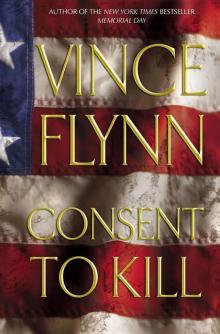 Consent to Kill
Consent to Kill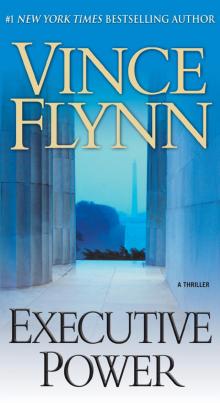 Executive Power
Executive Power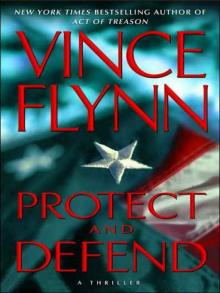 Protect and Defend
Protect and Defend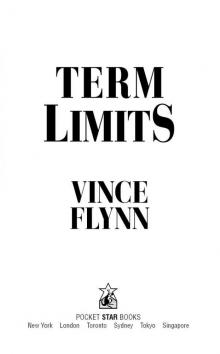 Term Limits
Term Limits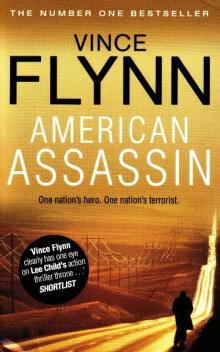 American Assassin
American Assassin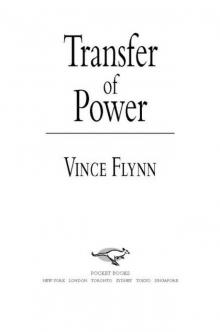 Transfer of Power
Transfer of Power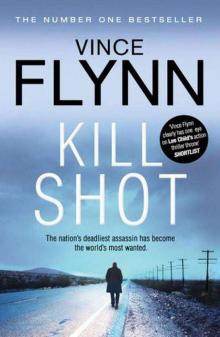 Kill Shot
Kill Shot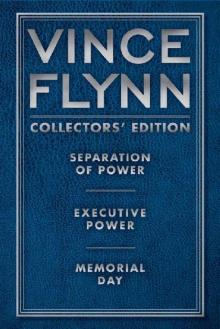 Vince Flynn Collectors' Edition 2
Vince Flynn Collectors' Edition 2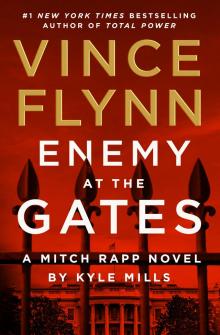 Enemy at the Gates
Enemy at the Gates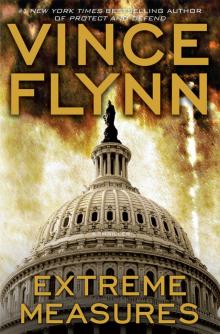 Extreme Measures
Extreme Measures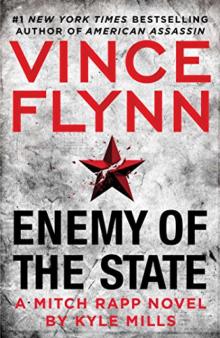 Enemy of the State
Enemy of the State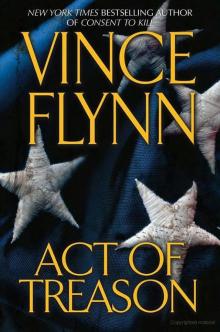 Act of Treason
Act of Treason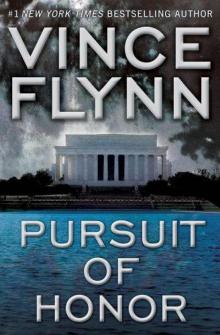 Pursuit of Honor
Pursuit of Honor The Survivor
The Survivor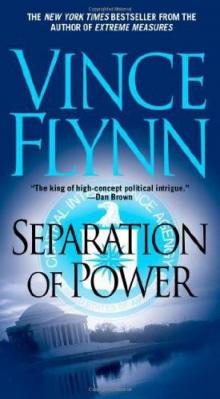 Separation of Power
Separation of Power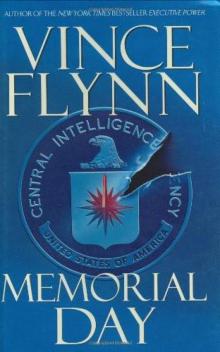 Memorial Day
Memorial Day The Last Man
The Last Man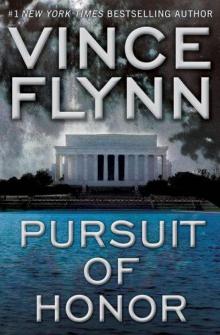 Pursuit of Honor_A Thriller
Pursuit of Honor_A Thriller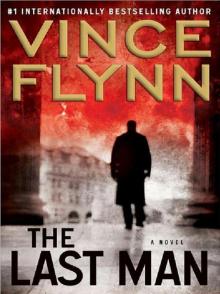 Mitch Rapp 13 - The Last Man
Mitch Rapp 13 - The Last Man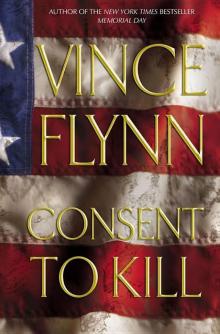 Consent to Kill:
Consent to Kill: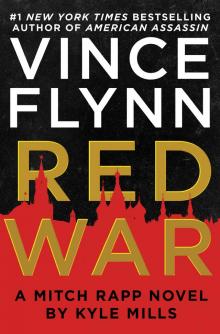 Red War
Red War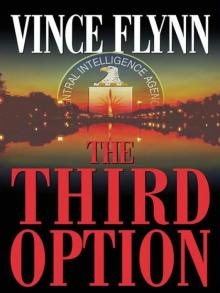 Mitch Rapp 02 - The Third Option
Mitch Rapp 02 - The Third Option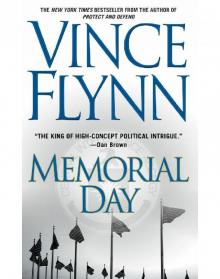 Mitch Rapp 05 - Memorial Day
Mitch Rapp 05 - Memorial Day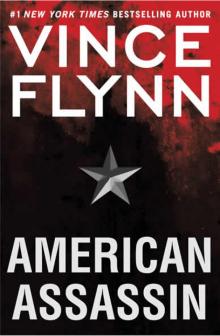 Mitch Rapp 11 - American Assassin
Mitch Rapp 11 - American Assassin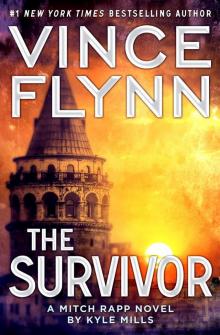 Mitch Rapp 14 - The Survivor
Mitch Rapp 14 - The Survivor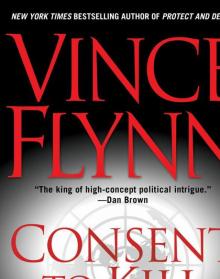 Mitch Rapp 06 - Consent to Kill
Mitch Rapp 06 - Consent to Kill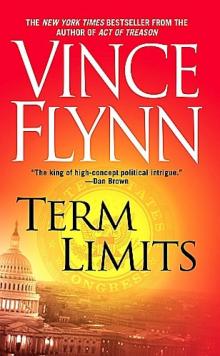 Term Limits mr-1
Term Limits mr-1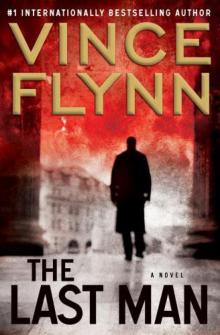 The Last Man mr-13
The Last Man mr-13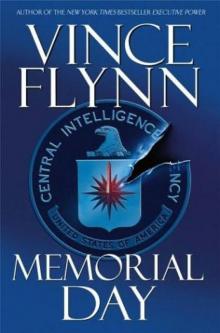 Memorial Day mr-5
Memorial Day mr-5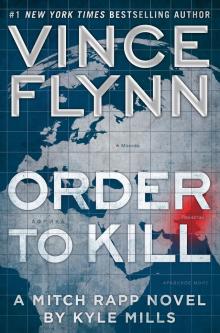 Order to Kill
Order to Kill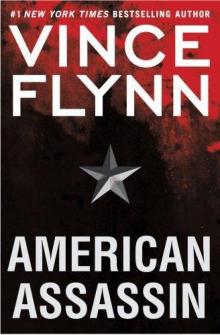 American Assassin: A Thriller
American Assassin: A Thriller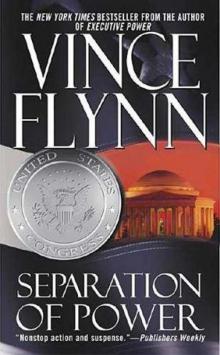 Separation of Power mr-3
Separation of Power mr-3